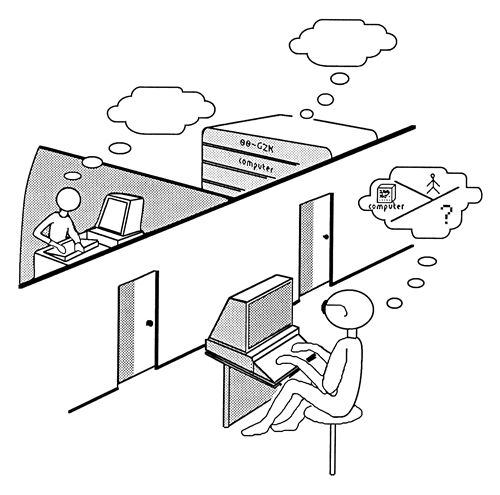I suppose you’ve heard of Watson, the Jeopardy playing robot. It’s a great case study for artificial intelligence. Watson has an almost limitless amount of information at its disposal (several terabytes). But, yet it gets things wrong. How is this possible? Consider the question “Its largest airport is named for a World War II hero; its second largest for a World War II battle”. Watson’s response: “Toronto”. Watson kind of works like a search engine, it gives a weight to key words in the question and the categories. It makes adjustments based on previous answers and produces a set of results it chooses from. So, it does a search for airports, people in WW2, battles in WW2, and cities. Then it combines, weighs them appropriately and produces an answer. The answer was probably right, but not “right”, the game show is US based and therefore a US answer is more likely.
The problem is universal to computers, they lack the basic assumptions you and I have. When I say a person X is dead, people understand what that means, a person that is dead is no longer animated and will always remain dead. But if you tell a computer that (say, in Prolog) it doesn’t understand that, I just assigns “person X” the value “dead”. Computer learning can help, but as with Watson, it can’t make this problem disappear.
One of the greatest problems facing the field of artificial intelligent is figuring out how to determine intelligence. One of the early computer scientists interested in this question was Alan Turing, who proposed the Turing Test. The idea was, essentially, if a person, through conversation, could not differentiate between a computer and a person, that computer was capable of thought.
An interesting aside about Alan Turing. Although a brilliant scientist, he was sentenced to chemical castration for being a homosexual as was the law in Britain during the time. Unable to live with the treatment, he committed suicide by ingesting an apple laced with cyanide. Rumor is, Apple’s iconic logo is in tribute to Alan Turing’s contribution to the field of computer science.
Back on track, there are several problems with the Turing Test. In practice, human judges become too suspicious and end up actually rating several humans as bots. In theory, there is the Chinese Room. In this theory, a man sits in a room with a book with responses to Chinese symbols. Chinese characters are passed to the man in the room and, after consulting the book, the man jots down the response and passes it out of the room. The theory holds that even though the outside observer may believe the box to know Chinese, the man inside the box does not actually “know” Chinese. Similarly, a computer just follows instructions (a program) and can never really “know” things.
Well, it’s an interesting view, but lets take the example a little further. The book that our man would be consulting would be very large, it would need to responded to every inquiry one could make in Chinese. Our man is only doing the simple work of finding and responding. Essentially our book plus man combo, and not the man alone, would be able the Turing Test.
Perhaps the problem isn’t the question we’re asking, but rather understanding what we’re trying to find in the first place. Perhaps the question should be: What is consciousness? It’s a question philosophers have grappled with for some time. Some define it as self awareness, emotions, or, if you’re religious, a soul. The best way that I have found to describe it is “our first person perspective”. When your body experiences something, your body does not just respond with a reflex “you” feel it. This raises some interesting questions. How do we know others are conscious, are they intellectual zombies? Are animal? Babies? Those that have undergone brain damage? How can we tell if a computer has gained a consciousness?
If a computer did become conscious, how would people react? Looking at popular fiction, some might accept it, as in Neuromancer, others may look to prevent it’s existence, as in Ghost in the Shell. Perhaps some would react in disgust, knowing that something exists like you but “different”. That is certainly the case of the Uncanny Valley.

No comments:
Post a Comment